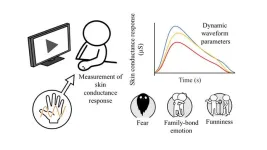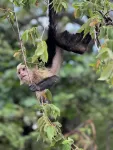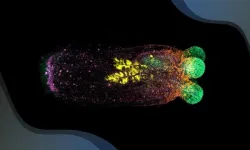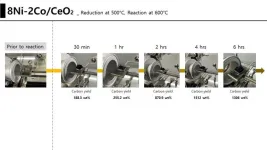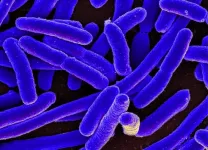(Press-News.org) Mill Valley, CA – December 1, 2024 – SynGAP Research Fund 501(c)(3), the leading patient advocacy group working to improve the lives of SYNGAP1-Related Disorders (SRD) patients, announces the appointment of Virginie McNamar as President and Chief Operating Officer, effective December 1, 2024.
“Virginie was a respected leader in the global SYNGAP1 community before SRF was founded. Her support and guidance in the early years was critical. Almost six years later, the SRF organization has grown to the point where a full time leader to manage the team, partners, and operations is overdue. Virginie’s experience in Rare Disease advocacy, demonstrated commitment to the SYNGAP1 global community, and tremendous talent made her an obvious choice for this role. Partnering with her to grow SRF for the benefit of SRD patients is already exciting. I’m grateful she accepted this role and look forward to her leadership,” stated Mike Graglia, SRF Founder and CEO.
The SRF Board of Trustees resoundingly approved the appointment of Virginie McNamar. “With the strategic objective of building out our upper management team, the Board established a cross-organizational search committee to conduct a thorough vetting process of viable candidates. Virginie’s extensive background in the rare space, coupled with her deep understanding of SYNGAP1, enable her to bring invaluable expertise to our organization. These qualifications, combined with proven corporate operational and project management skills, make her uniquely positioned for the role of President and Chief Operating Officer. Virginie is poised to hit the ground running as she delivers on advancing SRF’s mission and key priorities,” according to Suzanne Jones, SRF Board of Trustees Chair.
“It is an incredible honor to step into this role and continue the mission that has meant so much to my family and me,” said Virginie McNamar. “My journey with the SYNGAP1 and Rare Disease community began eight years ago, following my son Ty’s diagnosis. Since then, I’ve been inspired by the unwavering dedication of this community and humbled to witness the remarkable growth and impact of our organization.”
SRF has become a recognized force within the Rare Disease space, earning accolades from Rare Disease leaders, pharmaceutical companies, researchers, and other stakeholders for its exceptional recruitment capabilities, community engagement, and scientific contributions. “We’ve truly put SYNGAP1 on the map,” Virginie McNamar added. “I’m genuinely proud to be part of an organization that continues to set the standard for progress in Rare Diseases.”
Looking ahead, Virginie McNamar emphasized the need for robust organizational structure and strategic focus to meet the growing demands of the community and prepare for the next phase of clinical advancements. “We’ve moved fast, and with several clinical trials on the horizon, we need to accelerate. We must ensure our organization and community are ready. Simultaneously, we continue to invest in critical programs such as drug repurposing, family education, and advocacy, among others.”
In this new role, Virginie McNamar will work closely with CEO Mike Graglia, in addition to Dr. Kathryn Helde, PhD (Chief Scientific Officer), Lauren Perry (Operations Director), and an extraordinary team of leaders and volunteers. “I’m excited to collaborate with and support this talented team as we serve the global SYNGAP1 community and drive the organization to the next level,” Virginie McNamar said.
About Virginie McNamar
Virginie McNamar lives in Indianapolis with her husband and three children. She is originally from France where she graduated with a Masters in Marketing from Execlia Business School. She started her career in volunteer management first supporting large national and international events and later supporting nonprofit organizations. She worked as a product director for a volunteer management software company and then launched a social impact platform to support communities. Most recently, she was the Advocacy Partnerships Lead for Rare 7 Neurological Disease at Ciitizen, when it was a part of the Invitae Data Platform. There, she built partnerships with over 40 rare neurological and Rare Disease organizations.
Virginie’s youngest son was diagnosed with SYNGAP1-Related Disorders (SRD) in November 2016 at the age of 16 months. Since then, Virginie has dedicated her free time to help raise awareness, build strong local communities, and facilitate global collaboration. She co-founded Syngap Global Network and was a member of the original SRF leadership team.
Responsibilities as President and COO
The President and COO reports to the CEO, alongside the CSO and CFO. The President and COO leads the strategic and operational functions of our organization, in addition to working closely with the CEO and Board of Trustees to develop and implement strategies that maximize the impact of SRF.
About SYNGAP1-Related Disorders (SRD)
SYNGAP1-Related Disorders (ICD-10 F78.A1) is a rare genetic disorder caused by variants on the SYNGAP1 gene that reduce SynGAP protein levels. SRF has identified over 1,497 patients to date, and the number grows weekly. The SynGAP protein acts as a regulator in the synapses (where neurons communicate with each other). When SynGAP protein levels are too low, we see an increase in excitability in the synapses making it difficult for neurons to communicate effectively. This leads to many neurological issues seen in SynGAP patients.
Symptoms of SYNGAP1 include primarily neurological issues including autism spectrum disorder (ASD), intellectual disability, epilepsy, hypotonia (low muscle tone), gross and fine motor delays, global developmental delay, and visual abnormalities such as strabismus (crossed eyes), as well as gastrointestinal challenges and disordered sleep.
About the SynGAP Research Fund dba Cure SYNGAP1
The mission of the SynGAP Research Fund (SRF) is to improve the quality of life for SYNGAP1 patients through the research and development of treatments, therapies, and support systems.
SRF was founded in the US in 2018 as a 501(c)(3) US public charity, and families created sister organizations for SRF in the UK in 2020, in Europe (Netherlands) in 2022, and in Latin America (Colombia) in 2023.
Completely family-led, SRF is the largest non-government funder of SynGAP research having committed over $6.2 million in grants. The founders cover operational costs, ensuring that donations fund science & patient-related programs. SRF’s grant program awards one or two-year grants to investigators, physician residents, and clinicians interested in studying SYNGAP1. SRF grants are intended to help researchers explore novel ideas and answer open questions related to the clinical aspects of and therapies for SRD.
For more on SRF, visit curesyngap1.org or follow @cureSYNGAP1 on LinkedIn, YouTube, Instagram, Facebook, TikTok, or X.
SRF is a member of FasterCures, COMBINEDBrain, Global Genes Foundation Alliance, Everylife Foundation Community Congress, Epilepsies Action Network, Personalized Medicine Coalition, Rare Epilepsy Network, Epilepsy Leadership Council, Alliance for Genetic Etiologies in Neurodevelopmental Disorders and Autism (AGENDA), California Action Link for Rare Diseases, American Brain Coalition, Genetic Alliance UK, Rare Disease UK, Syndromes Without a Name (SWAN UK), Jumpstart Program, Patient Worthy, Autism Brain Net, Innovation and Value Initiative, Rare Disease Diversity Coalition, Cambridge Rare Disease Network, Breaking Down Barriers, Rare-X, Mencap, IndoUSRare, and The World Orphan Drug Congress.
END
Virginie McNamar appointed President and Chief Operating Officer (COO) of SynGAP Research Fund (SRF) dba Cure SYNGAP1
2024-12-01
ELSE PRESS RELEASES FROM THIS DATE:
Planetary boundaries: Confronting the global crisis of land degradation; Potsdam institute report opens UNCCD COP 16
2024-12-01
Riyadh, Saudi Arabia – A major new scientific report charts an urgent course correction for how the world grows food and uses land in order to avoid irretrievably compromising Earth’s capacity to support human and environmental wellbeing.
Produced under the leadership of Prof. Dr. Johan Rockström at the Potsdam Institute for Climate Impact Research (PIK) in collaboration with the UN Convention to Combat Desertification (UNCCD), the report is launched as nearly 200 UNCCD member states kick off their COP 16 summit ...
VUMC and Philips landmark emissions assessment of a radiology department published in premier industry journal
2024-12-01
A seminal cradle-to-grave analysis of hospital-based radiology services by the Department of Radiology at Vanderbilt University Medical Center and Royal Philips found the energy consumption from imaging equipment accounted for more than 50% of the department’s greenhouse gas emissions and shed light on areas to focus future evidence-based strategies to decarbonize.
The life cycle assessment (LCA) results, which have been peer-reviewed and published in Radiology, found diagnostic services generate the equivalent of nearly 1,100 gas-powered cars annually, or an estimated 4.6kt carbon dioxide equivalent.
Researchers ...
When devices can read human emotions without a camera
2024-11-30
Tokyo, Japan – Researchers from Tokyo Metropolitan University have used measurements of skin conductance over time to tell emotions apart. Volunteers were shown videos depicting fearful scenes, family bonding, and humor, while their skin conductance trace was recorded. The team’s analysis showed that traces could be used to make good guesses of which emotions were being felt. Advances like this help break down an over-reliance on facial data, bringing emotionally aware technologies closer to home.
A new frontier is being pioneered in consumer electronics: one day, digital devices might be able to offer services depending on your emotional ...
Warming temperatures impact immune performance of wild monkeys, U-M study shows
2024-11-29
Images/videos of capuchin monkeys
ANN ARBOR—The immune performance of wild capuchin monkeys declines when the animals experience higher temperatures, and younger monkeys seem to be particularly vulnerable to heat, according to a University of Michigan study.
U-M anthropology doctoral student Jordan Lucore examined how the immune systems of wild monkeys in Costa Rica were impacted by temperature. Lucore and a team of researchers found that when monkeys experienced about two weeks of warmer temperatures—86 degrees Fahrenheit—their generalized immune system performance declined. This is the part of the immune system that ...
Fine particulate air pollution may play a role in adverse birth outcomes
2024-11-29
Embargoed for release: Friday, November 29, 2:00 PM ET
Key points:
Exposure to PM2.5 was associated with higher levels of inflammation among pregnant women, potentially leading to adverse birth outcomes.
Study examined PM2.5 and maternal and fetal health on a single-cell level, using an innovative technology to detect how pollution modified the DNA within individual cells.
Findings provide new understanding of the biological pathways through which air pollution affects pregnancy and birth outcomes, ...
Sea anemone study shows how animals stay ‘in shape’
2024-11-29
Our bodies are remarkably skilled at adapting to changing environments. For example, whether amid summer heat or a winter freeze, our internal temperature remains steady at 37°C, thanks to a process called homeostasis. This hidden balancing act is vital for survival, enabling animals to maintain stable internal conditions even as the external world shifts. But recent research from the Ikmi Group at EMBL Heidelberg shows that homeostasis can extend beyond internal regulation and actively redefine an organism’s shape.
The starlet sea anemone (Nematostella vectensis) possesses remarkable regenerative abilities. Cut off its head ...
KIER unveils catalyst innovations for sustainable turquoise hydrogen solutions
2024-11-29
Dr. Woohyun Kim's research team from the Hydrogen Research Department at the Korea Institute of Energy Research (KIER) has successfully developed an innovative nickel-cobalt composite catalyst that can accelerate the production and commercialization of turquoise hydrogen.*
*Turquoise Hydrogen: A technology that produces hydrogen and carbon by decomposing hydrocarbons such as methane (CH₄) (CH₄ → C + 2H₂). Unlike gray hydrogen, the most widely used hydrogen production technology, ...
Bacteria ditch tags to dodge antibiotics
2024-11-29
Bacteria modify their ribosomes when exposed to widely used antibiotics, according to research published today in Nature Communications. The subtle changes might be enough to alter the binding site of drug targets and constitute a possible new mechanism of antibiotic resistance.
Escherichia coli is a common bacterium which is often harmless but can cause serious infections. The researchers exposed E. coli to streptomycin and kasugamycin, two drugs which treat bacterial infections. Streptomycin has been a staple in treating tuberculosis and other infections since the 1940s, while kasugamycin is less known but crucial in agricultural settings ...
New insights in plant response to high temperatures and drought
2024-11-29
Ghent, 29 November 2024 – We are increasingly confronted with the impacts of climate change, with failed harvests being only one example. Addressing these challenges requires multifaceted approaches, including making plants more resilient. An international research team led by researchers at VIB-UGent has unraveled how the opening and closing of stomata - tiny pores on leaves – is regulated in response to high temperatures and drought. These new insights, published in Nature Plants, pave the way for developing climate change-ready crops.
Global climate change affects more and more people, with extreme weather conditions ...
Strategies for safe and equitable access to water: a catalyst for global peace and security
2024-11-29
Water can be a catalyst for peace and security with a critical role in preventing conflicts and promoting cooperation among communities and nations - but only if managed equitably and sustainably, a new study reveals.
Experts have devised a blueprint to ensure safe, equitable and sustainable global access to clean water. The seven-point strategy will allow water challenges to be governed effectively so they do not create conflict when access is restricted or usage unfairly shared.
Publishing ...



